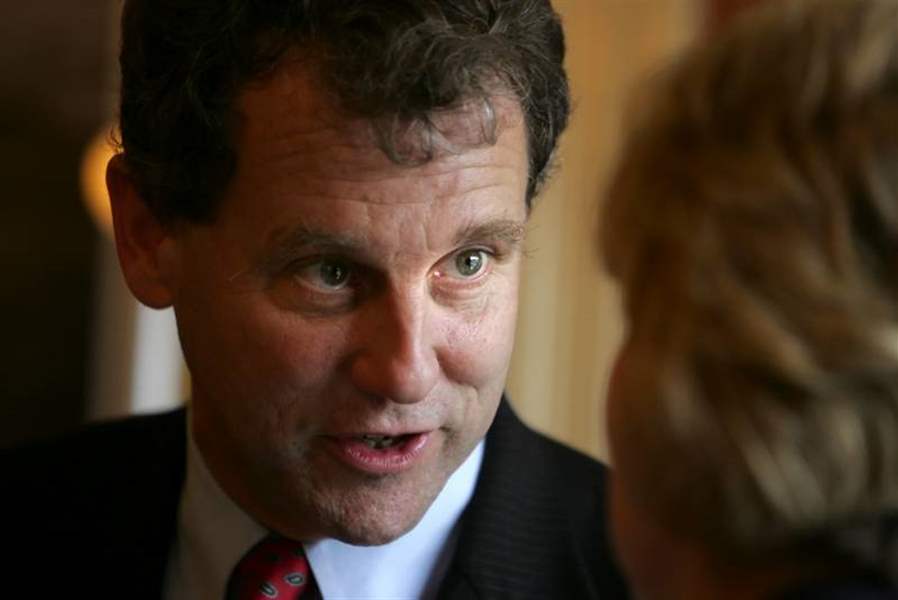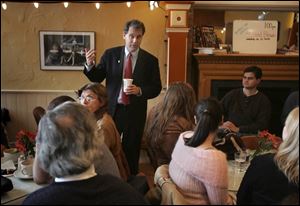
Hackett's research targeted Brown
2/20/2006
Sherrod Brown: U.S. Senate candidate.

Sherrod Brown: U.S. Senate candidate.
Congressman and U.S. Senate candidate Sherrod Brown voted to cut intelligence funding more than a dozen times before the Sept. 11, 2001, terrorist attacks, a record that Paul Hackett's campaign advisers called proof that Mr. Brown could not win in November.
A consultant hired by Mr. Hackett, Mr. Brown's onetime Democratic opponent for Senate, estimated the funding cuts would have totaled billions of dollars if enacted. None were. The consultant called Mr. Brown's votes on those proposals and a dozen more recent national security issues "toxic in today's political environment," according to campaign research documents obtained by The Blade.
Mr. Hackett quit the race last week, leaving Mr. Brown as the near-certain Democratic nominee against incumbent Republican Sen. Mike DeWine. But not before his campaign paid more than $5,000 to comb Mr. Brown's background for political weakness.
The research concluded it was unwise to attack Mr. Brown's career voting record in a Democratic primary, because he toed the party line faithfully. It also predicts Republican attacks on Mr. Brown this fall.
"For Sherrod Brown, the issue of terrorism presents a big problem," a Hackett consultant wrote in an undated memo. A paragraph later, the consultant called Mr. Brown's intelligence votes "evidence that Brown would be pummeled in a general election match-up, as we already know how Republicans use the issue of terrorism against Democrats."
Mr. Brown's campaign responded to questions about the Hackett research and Mr. Brown's votes with a written statement. It called keeping American safe Mr. Brown's top priority, said the congressman opposed the Iraq war because he knew it would divert resources from homeland security, and touted his work to strengthen ports, railways, and local emergency responders.
"Ohio voters are smart enough not to look at a one single vote, but to look at a record of fighting to make our communities and our country stronger and safer," campaign spokesman Joanna Kuebler said in the statement. "And Sherrod has done just that."
Mr. DeWine said last week that he believed his record was strong on intelligence. Asked about Mr. Brown's national security record and intelligence funding votes, Mr. DeWine replied, "I'm not going to get in to that yet."

Sherrod Brown, who spoke in Toledo in December, may be attacked by the GOP on some votes.
Mr. Hackett, an Iraq war veteran, pitched himself as a strong-on-security Democrat - and the party's only hope to beat Mr. DeWine - before leaving the Senate race. His researchers believed a string of Mr. Brown's votes, beginning in 1993 and verified by The Blade through Congressional records, could bolster Mr. Hackett's claims.
In August, 1993, his first year in Congress, Mr. Brown supported an amendment to reduce funding for intelligence agencies by 10 percent of what they'd received in the 1993 fiscal year. It failed by a 3-1 margin. Democrat Louis Stokes was the only Ohioan to vote with Mr. Brown.
Mr. Brown voted for similar attempts to cut intelligence budgets, most of them sponsored by Rep. Bernie Sanders (I., Vt.) or Rep. Barney Frank (D., Mass.), at least once a year through 1999.
More Ohio congressmen sided with Mr. Brown on the cuts at decade's end, including, on three occasions, U.S. Rep. Ted Strickland - now a Democratic candidate for Ohio governor.
The Hackett researchers also noted Mr. Brown voted against the entire intelligence appropriations bill in 1998 and voted twice to declassify Congress' intelligence spending levels, which are secret. He opposed creating the Department of Homeland Security, along with establishing and reauthorizing the USA Patriot Act.
Mr. Brown also voted against amendments to a 2004 intelligence overhaul that aimed to increase the government's power to detain and deport suspected terrorists.
Mr. DeWine entered the Senate in 1995 and voted for the intelligence budget throughout the decade. Congressional records show he never had to vote on a proposed cut to any of those budgets, because none were offered in the Senate.
The senator voted to keep intelligence budgets secret in 1997. He voted for creating the Homeland Security Department and consistently backed the Patriot Act. He sits on the Senate Select Committee on Intelligence.
Republican Party leaders including Karl Rove, President Bush's deputy chief of staff, have pushed candidates to focus this year on fighting terrorism, a strategy widely credited for GOP victories in 2002 and 2004.
"The United States faces a ruthless enemy - and we need a commander in chief and a Congress who understand the nature of the threat and the gravity that American finds itself in," Mr. Rove told a GOP gathering last month, the Associated Press reported. "President Bush and the Republican Party do. Unfortunately, the same cannot be said for many Democrats."
Republicans haven't attacked Mr. Brown's national security record yet. But they've already called him too liberal for Ohio.
Shortly after Mr. Hackett's withdrawal last week, the National Republican Senatorial Committee issued a news release calling Mr. Brown "fundamentally out of touch with the mainstream values of Ohioans" and more liberal than Rep. Dennis Kucinich (D., Cleveland), based on rankings from a national liberal advocacy group.
Mr. Hackett's researchers saw Mr. Brown's record similarly - from a completely different point of view.
A December consultant's memo noted that Congressional Quarterly scored Mr. Brown as having voted in step with Democratic Party "unity" 98 percent of the time in 2004 and 99 percent in 2003.
"While the campaign obviously would like to highlight poor votes by Rep. Brown that would alienate Democratic primary voters, the campaign must know that those votes are going to be few and far between," the memo said, adding: "Given that he supports the Democratic Party line on nearly every key vote, it is highly unlikely that there will be many votes that would hurt him with primary voters."
Congressional Quarterly gave Mr. DeWine a 79 percent party unity ranking in 2004 and 92 percent in 2003.
Mr. Brown said last week he expects attacks on his voting record, and that he will attack Mr. DeWine's on issues such as the Iraq war, Social Security privatization, and the Medicare prescription drug benefit.
"On most issues, voters are where I am," Mr. Brown said.
Contact Jim Tankersley at: jtankersley@theblade.com or 419-724-6134.